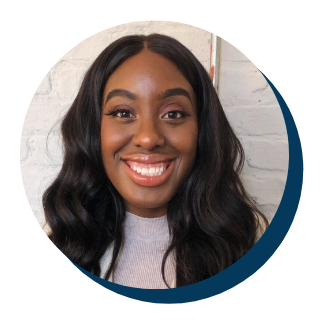Championing workplace equity as a Black woman
From Temi Akande (she/her), Search Associate at Meso Solutions
Growing up as a Black person in a predominantly white Georgia suburb, I was reminded constantly that I was different. One of the few Black students in my grade, and oftentimes the only Black person in my classes, my identity holistically shapes the lens through which I view the work of anti-discriminatory hiring. Now, as a Search Associate at Meso Solutions, I advocate for incredibly talented minority candidates across the country to match them with progressive organizations doing phenomenal, mission-based work. It is a blessing to work with two women of color and cultivate a space to learn from each other's experiences.
My parents, Nigerian immigrants, worked extremely hard to equip my family with the tools we needed to succeed. So despite being the “token” Black girl, I still had the privilege of growing up in a high-performing school district in Georgia — and didn’t have to confront my Blackness as often as others.
Fast forward to college, which opened my eyes to the complexities of race, class, and gender, both from an academic perspective and through my social experiences. I studied political science at the University of Illinois at Chicago, where learning about intersectionality empowered me to understand my privilege as a young, heterosexual, able-bodied Black woman with a college education. When college kickstarted my passion for progressive and political work, I promised myself never to let hurdles keep me from accomplishing my personal mission to advocate for Black women and marginalized individuals in everything I do.
Advocacy is my life’s work, and being a voice for people who haven’t had the chance to express their own is a cause I will remain dedicated to throughout my career. There is a saying I heard growing up that goes: “As a Black person, you have to work twice as hard to get half as much.” This concept committed me to overachieving — and sometimes overcompensating. People of color are often excluded from opportunities that they are qualified for simply because professional spaces do not make room for their talent. The assumption that Black candidates are not qualified for professional roles seriously hinders organizations from cultivating a culture that truly values diversity and equity.
Luckily, I’ve been reminded that it is not necessary to prove my worth to those who may not value it. But there are times when I’ve felt the pressure to be a certain “type” of Black woman to fit into progressive work environments. At Meso, we strongly encourage our clients to hire diverse candidates, but we ensure our clients truly understand the value-add and new perspectives each candidate could bring to their organization. We ensure progressive orgs tap into talent pools of candidates from marginalized communities and also take the steps to support these individuals in their careers.
As a Search Associate, I am a crucial part of this process for expanding workforce inclusion, because it all starts with the applications from candidates. I aim to combat racial discrimination in hiring from drafting inclusive job descriptions to certifying an impartial hiring process.
Each client has different needs in the equitable hiring process, but at Meso, we can help them every step of the way. Part of this work is conducting screenings or formulating grade skills tests. But most of all, it’s implementing these processes without applying one’s own biases — a skill that I continue to refine at Meso Solutions.
To learn more about combating racism in hiring practices, stay tuned for our upcoming webinar about deconstructing systemic racism in the workplace.
Finally, I’d like to conclude with a quote that encapsulates my career philosophy:
“For every door that’s been opened to me, I’ve tried to open my door to others. And here is what I have to say, finally: Let’s invite one another in. Maybe then we can begin to fear less, to make fewer wrong assumptions, to let go of the biases and stereotypes that unnecessarily divide us...There’s power in allowing yourself to be known and heard, in owning your unique story, in using your authentic voice.”
— Michelle Obama, Becoming

